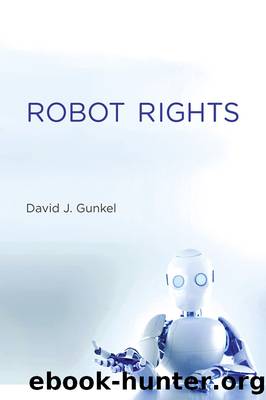Robot Rights (The MIT Press) by David J. Gunkel

Author:David J. Gunkel [Gunkel, David J.]
Language: eng
Format: epub
Amazon: B07JNKR9KS
Publisher: The MIT Press
Published: 2018-10-18T23:00:00+00:00
Similar to the argument offered by Bryson (but focusing on the technological and not legal/moral artifact), Yampolskiy argues that robots could be our equals in term of abilities, but they should not have rights. And they should not for two reasons. First, robots are and need to remain tools of human action, which are created and deployed for the benefit of their makers. Consequently, they should be designed and used as mere instruments to be exploited and disposed of as we see fit, and we should not design them to care about how they are treated or why. We have, in other words, an obligation not to build things to which we would feel obligated. Second, if we grant rights to robots, we are in danger of releasing a social transformation that we will not be able to control. For Yampolskiy this danger comes not in the form of the typical robot apocalypse (vividly imagined in science fiction) but in the rather less dramatic effect of voting rights and robot supported transformations in democratic governance. However it is accomplished, robot rights (or RR, as Yampolskiy writes it) would challenge or diminish human dignity and self-governance. Whether this is (or would be) the case, remains an open and debated question. Although Yampolskiy forcefully asserts his theory, he unfortunately offers little or no actual social/political data to support such a claim. It may sound intuitively correct (and perhaps this is due to the fact this scenario has been presented and prototyped in robot science fiction), but âsounding correctâ is not sufficient proof.
Lantz Fleming Miller, who, as we have previously seen (chapter 2), excludes robotsâeven and especially maximally humanlike automataâfrom moral consideration on the basis of fundamental ontological differences, is sympathetic to these arguments. According to Millerâs review of the existing literature, Bryson essentially gets it right but not necessarily for the right underlying reasons.
Bryson (2000; 2010; see also Bryson and Kime 2011) contends automata remain machines thus tools of humans and it is (ontologically) incorrect to merge the two and ethically wrong to delude people by attempting to blur the distinction. This position is consistent with mine below, which, though, shows exactly which ontological distinction is critical in terms of rights. However, Bryson (2009) almost hits on this distinction in emphasizing it is humans who decide to design and construct machines and are thereby in a position to decide what kind of beings they are. (Miller 2015, 373)
Download
This site does not store any files on its server. We only index and link to content provided by other sites. Please contact the content providers to delete copyright contents if any and email us, we'll remove relevant links or contents immediately.
Management Strategies for the Cloud Revolution: How Cloud Computing Is Transforming Business and Why You Can't Afford to Be Left Behind by Charles Babcock(4127)
Ego Is the Enemy by Ryan Holiday(3982)
Offensive Shellcode from Scratch by Rishalin Pillay(3614)
Exploring Deepfakes by Bryan Lyon and Matt Tora(3175)
Robo-Advisor with Python by Aki Ranin(2944)
Learning C# by Developing Games with Unity 2021 by Harrison Ferrone(2837)
Speed Up Your Python with Rust by Maxwell Flitton(2831)
Liar's Poker by Michael Lewis(2805)
Linux Command Line and Shell Scripting Techniques by Vedran Dakic and Jasmin Redzepagic(2782)
Agile Security Operations by Hinne Hettema(2780)
OPNsense Beginner to Professional by Julio Cesar Bueno de Camargo(2778)
Extreme DAX by Michiel Rozema & Henk Vlootman(2777)
Essential Cryptography for JavaScript Developers by Alessandro Segala(2717)
Elevating React Web Development with Gatsby by Samuel Larsen-Disney(2708)
AI-Powered Commerce by Andy Pandharikar & Frederik Bussler(2624)
Python for ArcGIS Pro by Silas Toms Bill Parker(2617)
Cryptography Algorithms by Massimo Bertaccini(2611)
Distributed .NET with Microsoft Orleans by Bhupesh Guptha Muthiyalu Suneel Kumar Kunani(2609)
Incident Response Techniques for Ransomware Attacks by Oleg Skulkin(2606)
